With over 100 construction management solutions (CMs) out there, the choice can be intimidating. Our 15 best construction tools list will help you digest the most important aspects of the premiere software in the market today.
Our scoring system is computed based on the software’s key features, value-for-money, benefits to specific niche uses, scalability, customization, and user adoption. We also look into pricing and integration as critical factors that make a topnotch CM software.
What are the 15 best construction management software solutions?
Most of these solutions will help improve team collaboration, cost visibility, and promote accountability at various degrees. After a careful assessment of myriad options, we arrived at these best construction software solutions to help guide your purchase decision.
1. Contractor Foreman

Contractor Foreman is a cloud-based construction management solution that has every tool you need for smooth operations. You can track project finances, accounting, planning, scheduling, and safety with the software. The cloud-based software lets you use it on your PC, smartphone, or tablet anywhere, anytime.
The dashboard lets you manage your construction business. Contractor Foreman is the easiest and most affordable platform of its kind. This makes it ideal for small- to medium-sized businesses that want more value.
Contractor Foreman gives you project management and estimation tools to complete all your projects on time and within budget. It also gives project insights from metrics. Corporate notes, appointments, and clocked-in employees and locations are examples. The app also tracks employee time with financial and accounting tools. Time cards, progress reporting, billing, and charge account reconciliation.
Contractor Foreman integrates seamlessly with QuickBooks Online, QuickBooks Desktop, Google Calendar, Outlook.com, and Outlook 365. It offers four pricing plans starting at $49/month. Try it for free for 30 days.
Detailed Contractor Foreman Review
2. Co-Construct
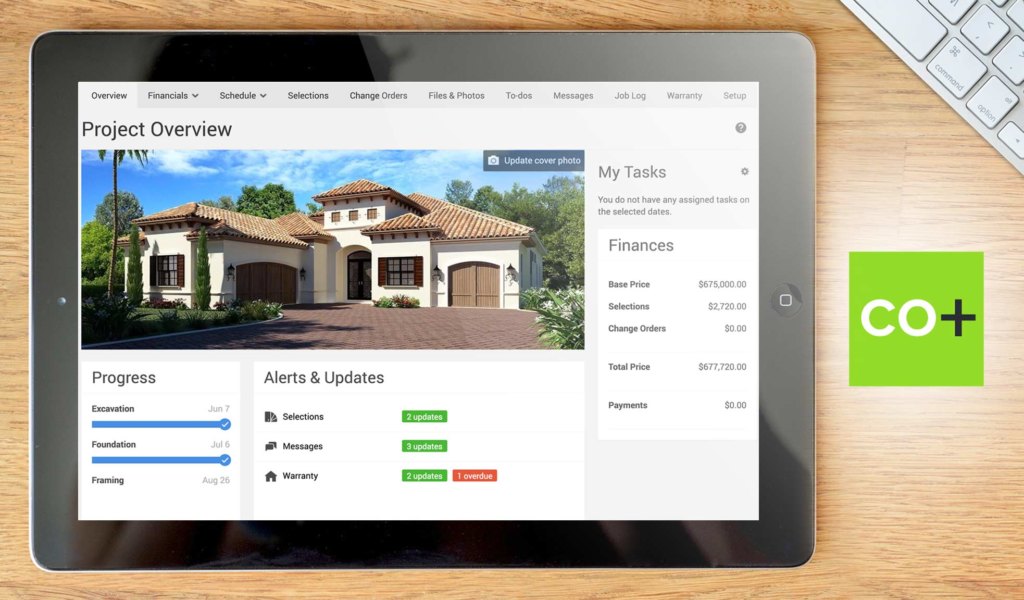
CoConstruct is offered both as a web-based and mobile construction management service and counts as one of the best representatives in this category that cater to creative and specific operations. It provides three robust functionality modules where users can manage perpetually changing concepts and benefit from almost unrestrained customization of activities, materials, and designs. Another thing that makes CoConstruct unique is open collaboration, as each project managed from the platform can be modified and revised by clients/partners in real-time.
Detailed CoConstruct Review
In parallel, CoConstuct is a single-entry and estimation system that allows users to control and manage all bidding and client information from a centralized hub, and create dedicated client portals for easier content tracking and order control. Within the system, you will also find a detailed financial module used for professional budgeting, estimate and proposal management, bidding, and accurate forecasting.
With CoConstruct, you can create bids in minutes, as you already have all estimate data and valuable specs imported in the system. In the meanwhile, you can choose any of the system’s beautiful pre-made templates to make your proposals more engaging. With communication being as streamlined as possible, you won’t be expected to wait on your trades, and you can submit successful proposals at the right place, and at the right moment. CoConstruct is also an excellent choice for marketing and customized branding, as you can design it in your own way, and use an array of professional marketing materials (custom videos, PP presentations, etc.) to promote your work.
3. Corecon

Corecon is an all-in-one construction management software trusted by over 6000 companies in 15 countries. Covering everything from lead tracking and project management to team collaboration and job costing, this platform allows SMBs to manage their operations from end to end in a single hub. It even provides users with mobile applications so they can monitor their workflows on the fly.
With Corecon, you get access to a lead-to-project wizard that lets you automate the process of converting prospective clients and managing vendor bids. You can use its project management suite to draft contracts, perform workforce scheduling, and collaborate with internal and external parties. It even comes with documentation options that will keep track of your progress at a granular level.
Corecon also comes with financial management options that make it easier to prepare invoices, record expenses, as well as perform budgeting so you won’t have to rely on a third-party platform to handle your money matters.
Another benefit to be had with Corecon is that it goes beyond construction management. It comes with its own modules for communication, human resource management, time management, file management, and analytics.
Detailed Corecon Review
4. PlanGrid
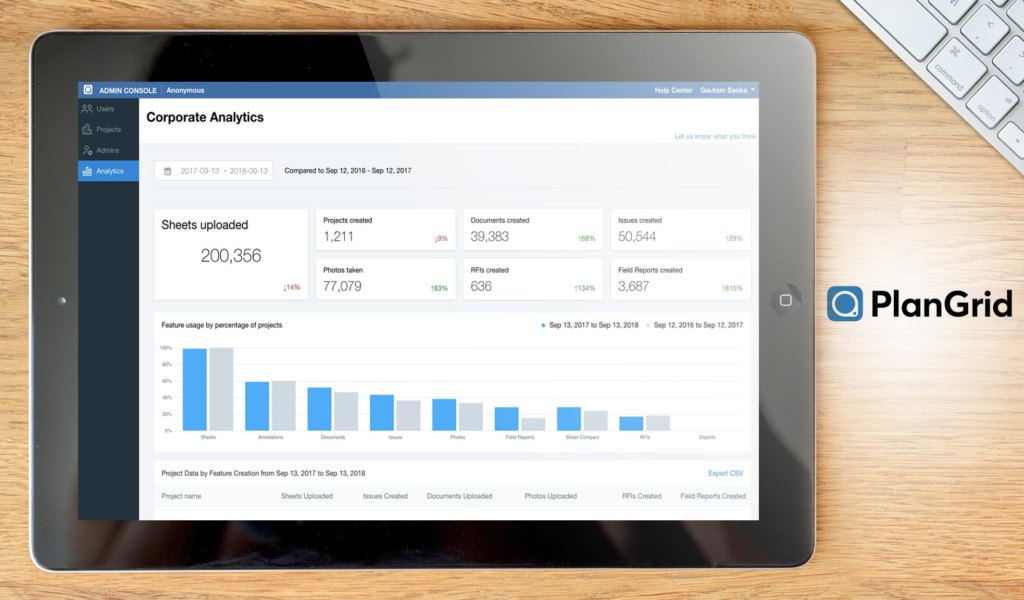
PlanGrid is known for its mobility, automation, and end-to-end architecture. Designed for the field with easy navigation and cloud access, the CM solution is perfect for both agile and fix-structured construction projects across industries. It is known as the first to offer end-to-end request-for-information (RFI) platform. This feature allowed us to implement a process-driven RFI, where we could clearly spot suppliers’ capabilities.
PlanGrid’s RFI platform also lets you handle thousands of admin licenses, so data access isn’t tied to a device. You’ll love this feature should you lose your tablet or phone or your computer crashes. Similarly, its mobile platform lets you access the whole job including plans, specs, photos, RFIs, and punch-lists. No more lugging cumbersome blueprints and checklists–just your tablet or laptop and an internet connection.
Detailed Autodesk PlanGrid Review
We also noted this CM software for its great mix of central data repository and collaboration tools. You can compare sheets, add annotations, or render blueprints, among others, in one location and link them to RFI feedback, submittals, or other related files. Your teams stay updated with the latest information. Likewise, you and the teams get full visibility across the project lifecycle.
Another major benefit of PlanGrid is its automation feature. You can save time by cutting on manual tasks. For instance, you can replicate a version and the software automatically formats it. PlanGrid is also notable for its security via permission controls and secure cloud servers.
5. Procore

Procore is one of the more popular CM solutions because it can handle different construction project types, from retail facilities, apartment units and office buildings to industrial complexes. Like PlanGrid, Procore helps boost efficiency and accountability by streamlining documentation and communication workflows between field and office. Its pricing is by quote only; companies on a scaled budget may find this setup less flexible.
One of the best aspects of Procore is that it can be accessed by unlimited number of users at no added cost. This fits subcontractors that need to add or reduce staff by project types. We also like the drawing-centric approach of Procore. Photos, punch lists, RFIs, submittals, etc. are placed in a central location that can easily be accessed by any team member. This reduces information conflicts and saves time locating submittals.
Detailed Procore Review
We also like the fact that Procore can generate real-time data that can be accessed in different locations. Data is in sync across platforms and channels, ensuring integrity of information.
Other key benefits of Procore include: quick lookups using dashboard; integration with Sage 300 CRE; and unlimited connectivity to business apps.
6. e-Builder
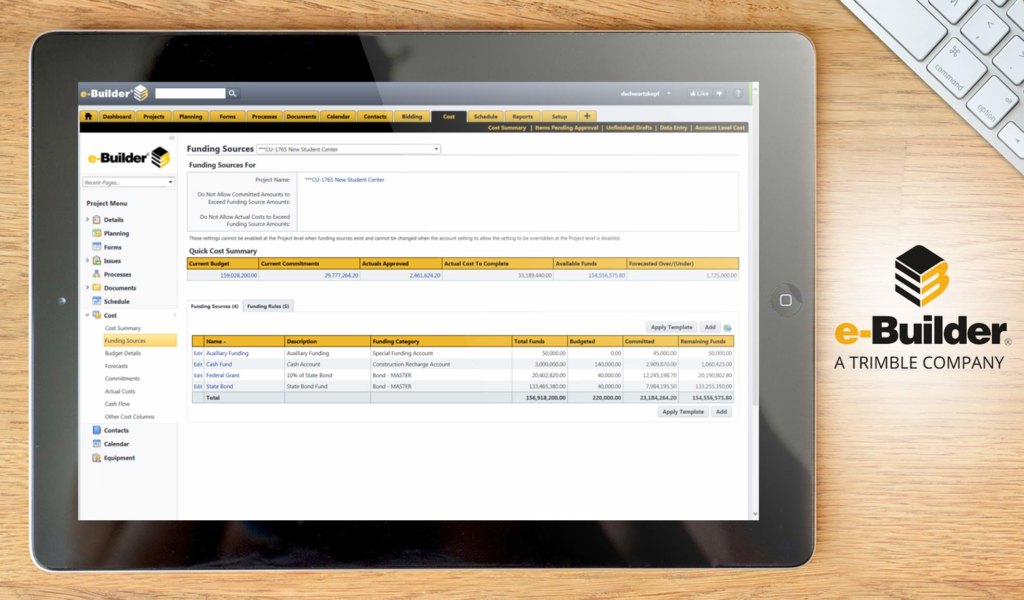
e-Builder is arguably one of the most comprehensive cloud construction management suites with great auditing, collaboration, and tracking features. As a fully integrated owner-centric solution, e-Builder is ideal for facility owners and construction managers of complex projects.
Detailed e-Builder Review
We think its owner-centric process orientation is practical, which allows owners to benchmark and track every stage of the capital project delivery workflow from planning to operations. This makes e-Builder one of the most flexible options if you’re handling a wide range of project types.
Specifically, we like three benefits that this CM solution delivers. First, it provides audit control in a secure platform. You can lay down budgets across project stages or the entire construction without leaking confidential information. Second, the software uses Critical Path Methodology, an industry standard to help you identify gaps and track milestones to project completion. Third, e-Builder lets you manage design review workflow through automate review and tracking. This allows you to view CAD and BIM files on any browser, a handy benefit when you’re off-base.
7. Aconex
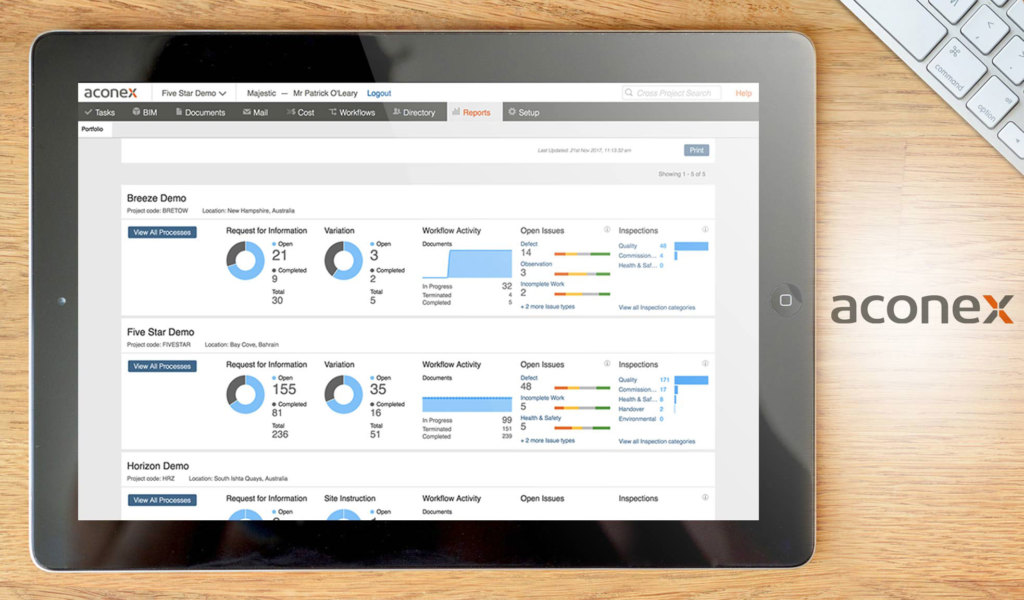
We find Aconex user-friendly and flexible for different sets of users. Its features and pricing can be scaled, even as this CM solution can be deployed as a full suite with advanced tools like insights and project-wide controls.
Aconex is ideal for general contractors, project managers, subcontractors, and their clients in highly complex industries, such as, mining, energy, and heavy sectors. If your project involves thousands of human resources, this software can deliver top-level efficiency and boost productivity down on the ground.
Detailed Aconex Review
The most notable aspect of this software is the control it gives users at different levels of the organization, while transparency in each level is kept. Delegation of tasks is easier without compromising security. This way, workflows are also fast-tracked and task duplicates or conflicts are avoided.
Aconex is also promising for its detailed reporting, a handy feature if you’re managing complex projects with plenty of parties involved–multi-tiered clients, suppliers, subcontractors, for instance–that need to move together in sync.
8. Acculynx
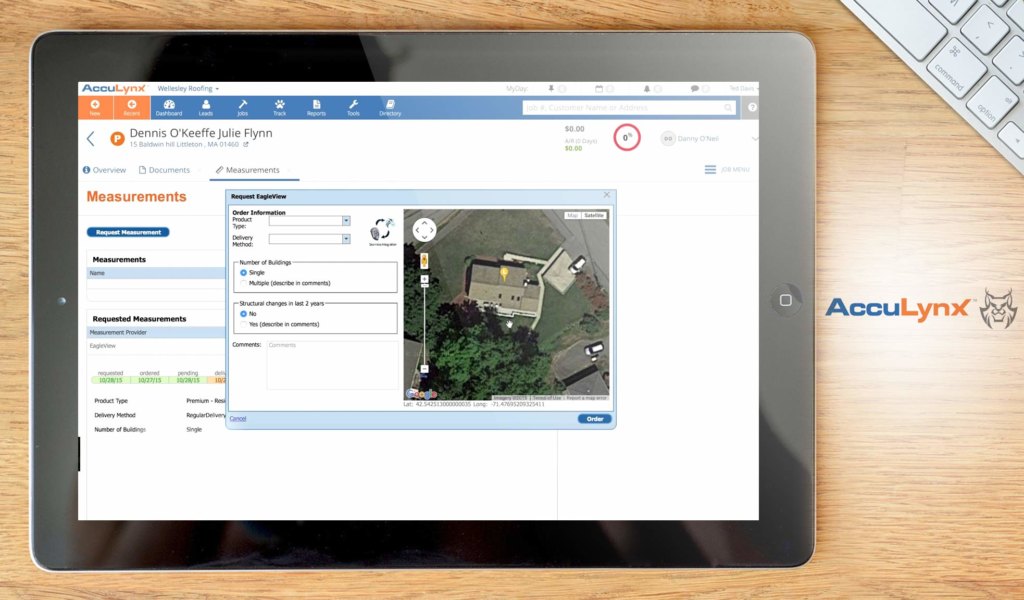
Acculynx has comprehensive features required by medium to large constructions firms involved in general contracting, home building, property development, and even specialty contracting jobs. The CM software has a full range of project management tools including for: scheduling, estimation, accounting, and customer support.
Detailed Acculynx Review
We noted four main values this solution can offer. First, it lends great visibility across your organization. Each member is connected; thus, ensuring activities and schedules are in sync. Second, it is easily accessible, thanks to being cloud-based and its mobile platform. Users can easily retrieve and share files, images, and documents.
Third, communication is well laid out in real time and across organization, ensuring all participants from clients to staff are in the loop. Lastly, Acculynx has great reporting and analytics tools that are practical for sales-driven aspects of the construction business.
9. Newforma
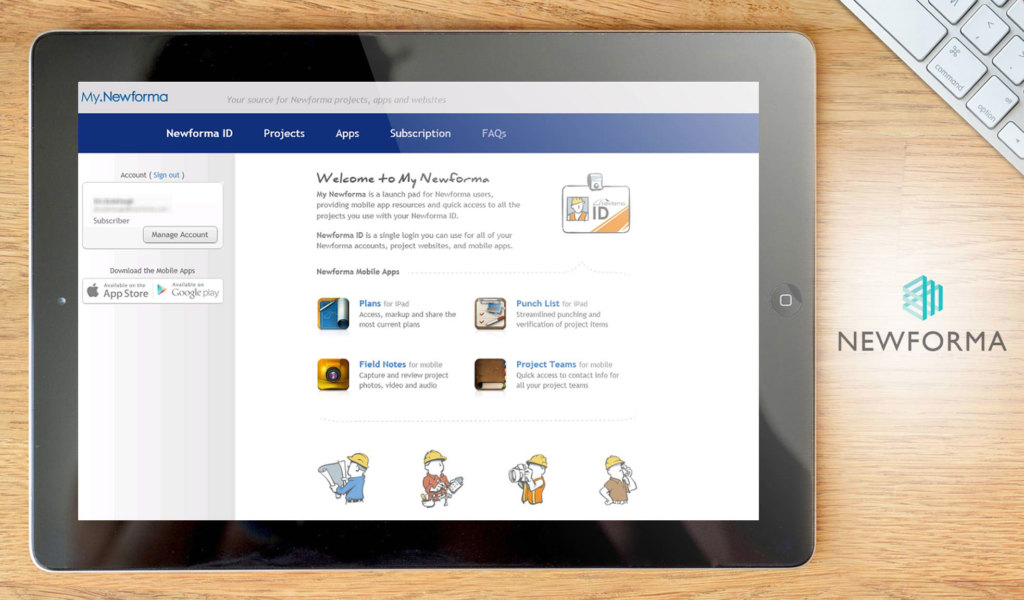
The first thing we noted about Newforma is it’s extensively collaborative. The CM software is designed as a project information management (PIM), which helps to align external stakeholders with each other for greater co-operation. This is perfect to ensure architecture, engineering, and construction are in sync.
Detailed Newforma Review
Anyone can share and access all or select data in Newforma based on user roles. There’s a visual context sharing and live collaboration, both of which reduce communication gaps and duplicate or missed tasks. Likewise, Newforma’s collaboration platform helps you to nurture sharing of best practices between teams. Topnotch managers can fine tune lean processes, streamline document flow, and expedite submittals and modelling with this software by incorporating on-the-ground outcomes shared by teams. The result is an efficient management poised for higher profitability.
10. GradeBeam
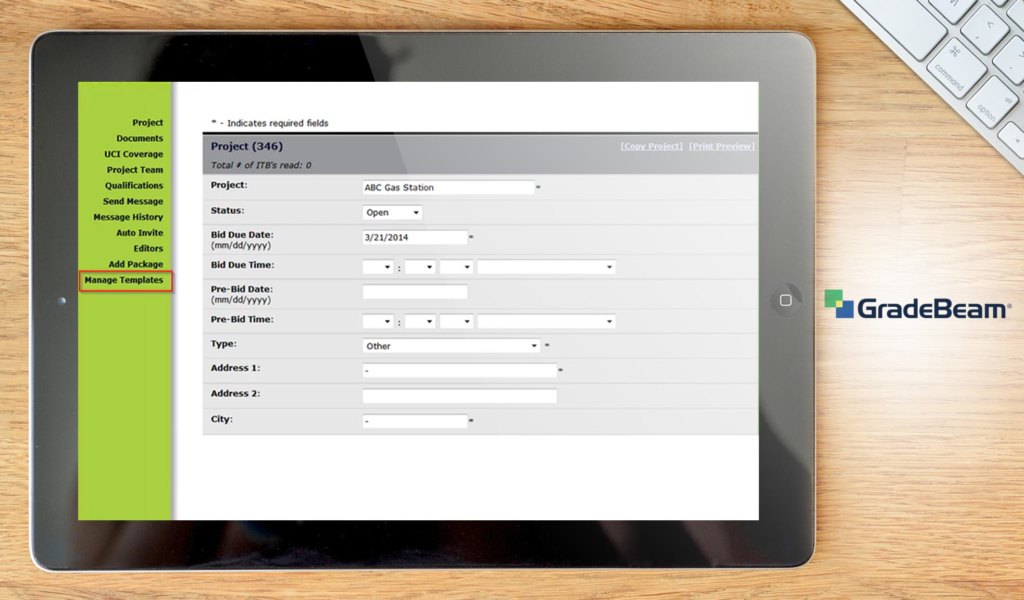
GradeBeam is a CM solution geared towards improving communication among key players. It allows them to share information and best practices. GradeBeam can help you reduce delays and its costs by laying down a transparent, easily accessible platform to exchange project-related discussions across the organization and between clients, subcontractors, and other project stakeholders. The CM software is targeted at general contractors, suppliers, distributors, and construction professionals.
As a communication platform, GradeBeam can handle accelerated exchange of huge volumes of data throughout the project’s lifespan. These include ITBs, drawing specs, notes, corrections, RFIs, replies, and purchase orders.
Detailed GradeBeam Review
The software can also be a platform to share best practices in specific areas during the execution stage. You can quickly implement improvements or modifications in your processes using insights from the ground up. Users can share or archive documents, plans, ideas, and notes in a centralized location that others can access. We find having a network of data connected to users critical to running an agile project–everyone is not only informed, but updated.
We also like how GradeBeam integrates with BidOrganizer and PQM to help you track changes throughout the construction bid phase.
11. Viewpoint

Aside from offering standard CM features like project management, estimation, and data repository, Viewpoint is notable for its accounting module. It lets you generate real-time cost-benefit reporting as the project progresses. If you’re strict on the budget, you’ll find this a useful tool to keeping an eye on potential financial leaks during project execution.
Detailed Viewpoint Review
You can also configure Viewpoint to accommodate revenue rate changes for individual construction items. Likewise, computing monthly depreciation of fixed assets is integrated to this CM software. The software is also capable of real-time job costing to help you generate accounting reports that reflect the latest scenario.
Other than its accounting module, Viewpoint is a standard CM solution. Features include an integrated project management, data management and risk Management modules.
12. Textura
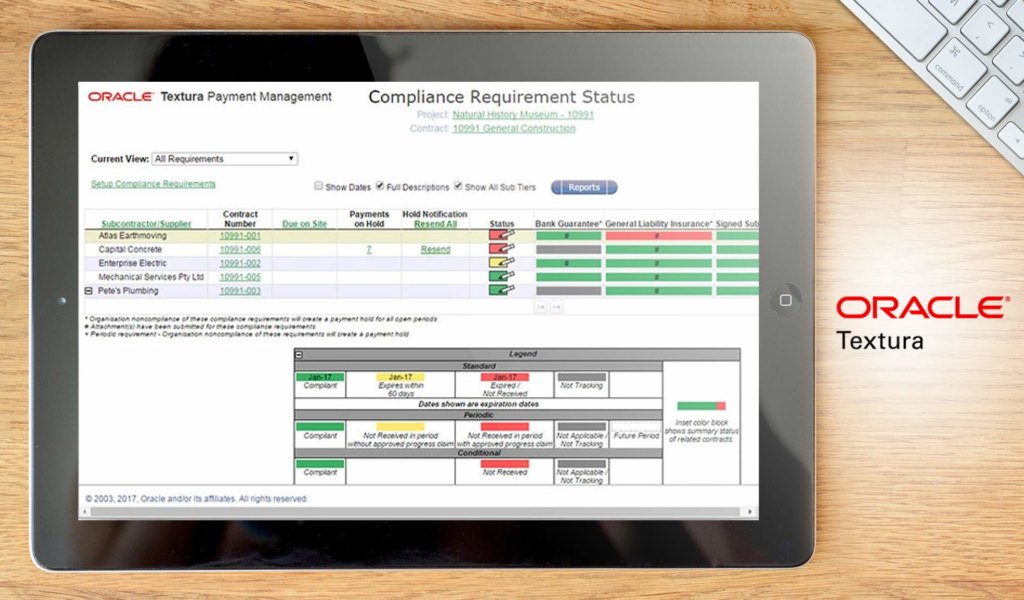
Rounding up our top ten CM solutions, Textura is your software for general construction projects. It has no unique features, just the regular functions of a comprehensive CM SaaS.
Detailed Textura Review
As with our top choices, Textura aims to enhance collaboration between internal and external teams and boost productivity on the ground. Contractors, suppliers, and clients can work closely together with Textura as a communication and data platform. The general CM software is useful throughout the project lifecycle, from planning to closing.
It has good integration with key systems including: single click estimates with Planswift; bid management with GradeBeam and BidOrganizer; qualification management with PQM; field management with Latista; payment management with CPM; and document management with Submittal Exchange.
13. BuilderTREND
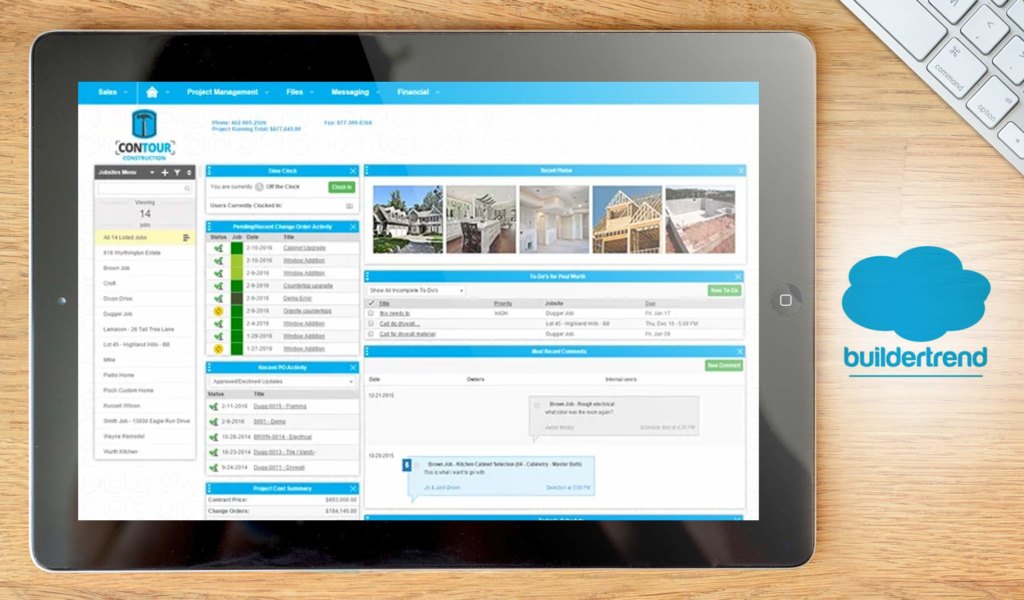
Our last five CM solutions are worth the honorable mention in this list for their specific niches. For instance, BuilderTREND is ideal for home builders and remodelers. Where smaller construction and design firms may find an enterprise solution complex and costly, they’ll like that this CM software has a suite of tools that’ll do the job: project scheduling, customer management, service management, and project management. At a fixed $99 SaaS entry plan, this software is easy to budget.
Detailed Buildertrend Review
Moreover, smaller firms may find the integrated CRM system and bids and proposal tools useful. This component lets them generate proposals fast and track bids. BuilderTREND can surface historical data to base quotes on, so cost estimates are consistent.
Other key benefits of this software include: documents can be shared and accessed easily via the mobile platform; notification tools update all team members in real time; and specific to-do lists for each user make sure everybody knows their roles and activity targets.
14. Deltek Ajera

Deltek Ajera is also targeted at small and medium companies, mainly in the architecture and engineering space. It is priced by quote, but is tailored to the budgets of small construction firms.
Detailed Deltek Ajera Review
Specifically, the CM solution is ideal for companies that are moving out of QuickBooks and require more sophisticated software to sort and measure different ROI indicators. These include staff utilization, overhead management, and project cost-benefit analysis.
We note four key benefits that small companies can reap from Deltek Ajera. First, they get visibility across project lifecycles for all their clients. They can easily spot opportunities or address issues. Second, they can streamline processes from prospecting–the software has market automation–to project closing. Third, as mentioned, its market automation can capture leads and recurring projects more easily. Fourth, they can free up more time by automating administrative tasks like proposal generation.
15. Sage 300 Construction
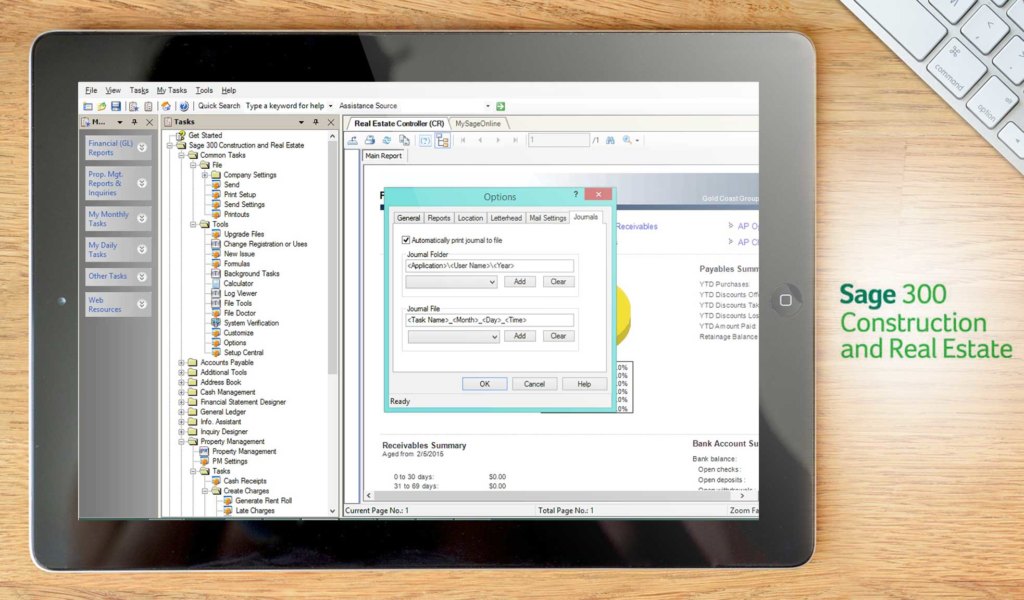
Sage 300 Construction is ideal for property management and real estate companies. It is a comprehensive suite of project management tools, ERP, HR, payroll, assets; but its primary appeal lies on its accounting and financial functions for construction projects. This CM solution is a SaaS end-to-end system that satisfies the most complex problems of large enterprises, but may be too much for small and even medium companies.
Detailed Sage 300 Construction Review
The clear advantage of Sage 300 Construction over other enterprise solutions is its ability to provide timely control over the accounting aspects of the project. The design is built on the strength of Sage accounting tools, including its customizable reports and add-ons.
The software’s collaborative functions are solid. Like our top choice, PlanGrid, Sage 300 Construction provides shared communication platforms for internal and external teams, while its user permissions provide security for sensitive data.




























Leave a comment!